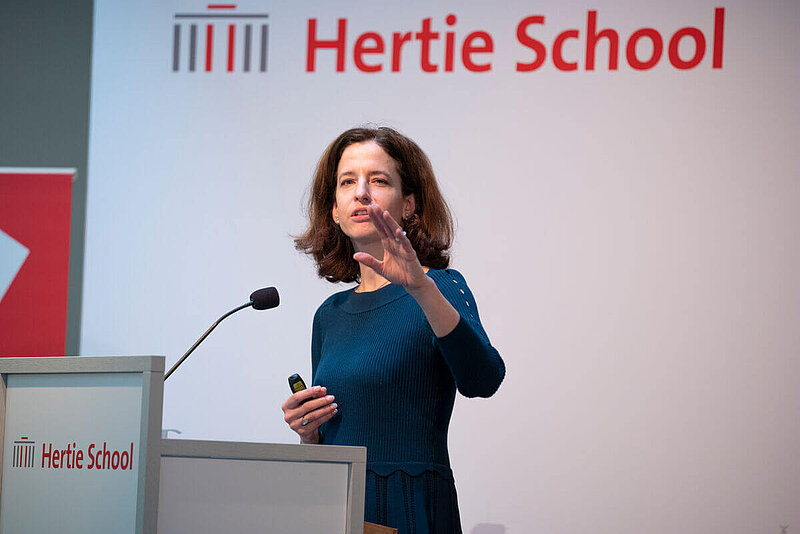
The Summit for a New Global Financing Pact needs to address the dilemma struggling indebted countries face, the Hertie School President writes in Tagesspiegel and Handelsblatt.
For indebted countries reeling from the effects of crises, the global financial system is not working, says Hertie School President Cornelia Woll. In an op-ed published in Tagesspiegel and Handelsblatt, the Professor of International Political Economy called for reform in the context of the Summit for a New Global Financing Pact in Paris starting today.
According to Woll, the traditional system of global financial stability is ill-equipped to deal with the challenges of crises such as global warming and pandemics. In many instances, for already indebted countries, this has meant turning to China as a “creditor of last resort”. Yet because China does not allow struggling countries to restructure their debt, such countries could end up trapped if they had also received loans from Western countries. If the country defaults on its loans, the Western creditor would be unlikely to forgive their debt because this could allow the country to repay its loan to China, Woll explains.
“Without a coordinated approach or a common set of rules, two potentially antagonistic lenders would make debt relief impossible,” says Woll. “We urgently need a reform that reflects multipolar power relations and considers the needs of the Global South.”
Read an English translation of Cornelia Woll’s op-ed below.
---
Why we need to reinvent global financial solidarity
On 23 June, world leaders and experts will gather in Paris at a summit for a New Global Financing Pact. With an impressive guest list, Emmanuel Macron is pursuing an ambitious goal: to reinvent the principles of financial solidarity among countries in the world. What may seem presumptuous at first sight could hardly be more timely.
Redesigning the institutions providing financial support to struggling nations is urgent and became all too visible in the recent series of crises. Countries that are vulnerable to climate change have called for support under the label “loss and damages” in recent climate negotiations. Prime Minister of Barbados Mia Mottley has led the “Bridgetown Initiative” to call attention to the unequal burden carried by poorer countries when they attempt to borrow money in order to respond to natural disasters. The pandemic as well as the effects of the war in Ukraine on global food security also exposed numerous countries to severe external costs. While advanced industrial nations might find the resources to cushion those shocks through their own fiscal efforts, countries that are already struggling can be pushed over the brink.
Post-war institutions do not reflect a multipolar world
The traditional system of global financial stability is ill equipped to deal with these challenges. What is more, the Bretton Woods institutions – the World Bank and the International Monetary Fund – carry the marks of their post-war origins, dominated by the ambitions of the West and in particular the United States. Reforming them to reflect the increasingly multipolar world has been on the table for over 20 years without making much headway. Neither Europe nor the United States have been willing to reform IMF quotas to give a greater weight to China.
As a result, China has developed a parallel system in line with its own interests. A recent paper published by the Kiel Institute for the World Economy shows that China has grown into a lender of last resort. Through global swap lines with over 40 central banks in the world, the People’s Bank of China has provided liquidity support of USD 170 billion to countries in crisis. In addition, Chinese state-owned companies have provided USD 70 billion in loans. Taken together, that is roughly 20% of total IMF lending. And we have not even talked about the USD 800 billions provided in loans for infrastructure that form China’s Belt and Road Initiative.
One may be tempted to salute the multiplication of funding and rescue efforts. The more money there is to go around, the better. But investments and lending of last resort have profound effects on the trajectories of countries, the well-being of their societies, and the stability of the global economy. Restructuring of debt is an integral part of development assistance in the West, with the aim to avoid the collapse of countries in fragile situations. China’s approach has been stricter, with dire consequences for countries that are defaulting, such as Sri Lanka. With Pakistan, Ethiopia, Ghana or Zambia in similarly troubling situations, one can have reasons to be concerned. The rift that has opened between the United States and China over financial solidarity is no secret and affects the West’s capacity to maintain its own system of financial solidarity.
Consider a country that has loans from both Western countries and China and risks default. Would the West accept debt forgiveness, if it means that the loans it writes down would finance the repayment to Chinese lenders? Probably not. Without a coordinated approach or a common set of rules on the hierarchy of liabilities, two parallel and potentially antagonistic lenders would simply make debt forgiveness impossible.
Redesigning Bretton Woods in order to reflect the multipolarity of the world and to take into account the needs of the Global South is urgent. The stability of countries in all parts of the world is crucial for their self-determination, their social cohesion, the fight against poverty and internal and external security. It is also a responsibility in our globally connected world, where crisis spread across borders and where we need to provide economic development that is sustainable and just. One has to hope that world leaders and experts take the opportunity to develop a cooperative approach to financial solidarity across the globe in the future.
The Hertie School is not responsible for any content linked or referred to from these pages. Views expressed by the author may not necessarily reflect the views and values of the Hertie School.
More about our expert
-
Cornelia Woll, President and Professor of International Political Economy
